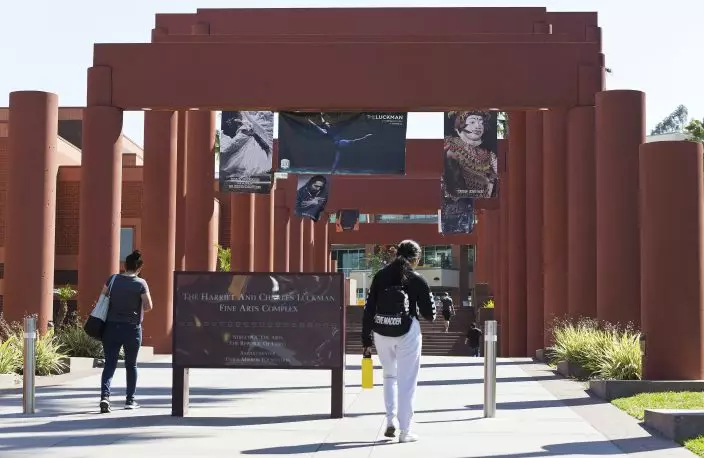The Federal Emergency Management Agency plans to stop operating two mass vaccination sites in California next month, just days before the state makes everyone 16 and older eligible for a shot.
The two sites in Oakland and Los Angeles opened in February for an eight-week pilot program that concludes on April 15. The sites will switch from the Pfizer to the Johnson & Johnson vaccine, which requires just one shot, during the final two weeks of operation so that people do not have to sign up for a second dose elsewhere.
State and county officials said they would have liked the program to continue, though it provided a small fraction of California's overall shots. Each site has the capacity to vaccinate at least 6,000 people per day but have been administering up to 7,500 shots per day, according to the state Office of Emergency Services. California is now administering about 1.8 million shots per week.

FILE - In this April 25, 2019, photo students walk past the Harriet and Charles Luckman Fine Arts Complex at the Cal State University, Los Angeles campus. The Federal Emergency Management Agency plans to end its mass vaccination pilot programs in Oakland and Cal State LA campus in Los Angeles next month. Officials said Friday, March 26, 2021, that the vaccine sites have provided nearly a half-million doses so far. (AP PhotoDamian Dovarganes, File)
Gov. Gavin Newsom announced Thursday the state will allow everyone 16 and older to be eligible for the vaccine starting on April 15. Right now people 65 and over, younger people with certain health conditions and farmworkers, teachers and several other occupations are eligible.
The two sites combined have administered half a million doses, with about 67% going to underserved communities and people of color, according to OES.
Brian Ferguson, a spokesman for the agency, said the state is working with Los Angeles and Alameda counties to see if they can continue to put the sites at the Oakland Coliseum and the California State University, Los Angeles, campus to use. The state asked for an extension of the program but it has not been granted.
“We’ve been clear that California is ready to continue the mission if further funding and vaccines would be allocated by the federal government,” he said.
Officials in the county and city of Los Angeles are in discussions about maintaining the site in some fashion, said Dr. Paul Simon, the chief science officer for Los Angeles County.
“While we are disappointed, we understand,” he said about the site's closure.
It’s not yet been determined if the campus would remain as a site or its vaccines would be distributed to smaller community sites.
“We recognize it’s a really important site,” Simon said, adding that officials do not want to scale back vaccine infrastructure just as more supply is on its way.
Representatives for the Alameda County Public Health Department, Oakland Mayor Libby Schaaf and Alameda County Board of Supervisors President Keith Carson did not respond to requests for comment about the closure of the Oakland site.
A spokesman for FEMA could not immediately answer questions on whether the agency considered California's request to extend the program or whether the doses will now be allocated to similar sites in another state.
Sami Gallegos, a spokeswoman for the California Department of Public Health, said California will continue to pursue its equity goals through other sites. The state has reserved 40% of all doses for people in the least advantaged neighborhoods, many of whom were vaccinated at the two federal sites. The state has more than 2,000 vaccination sites, she said.
“California’s commitment to equity is much more than just two vaccination sites," she said.
Associated Press writer Adam Beam contributed from Sacramento.


